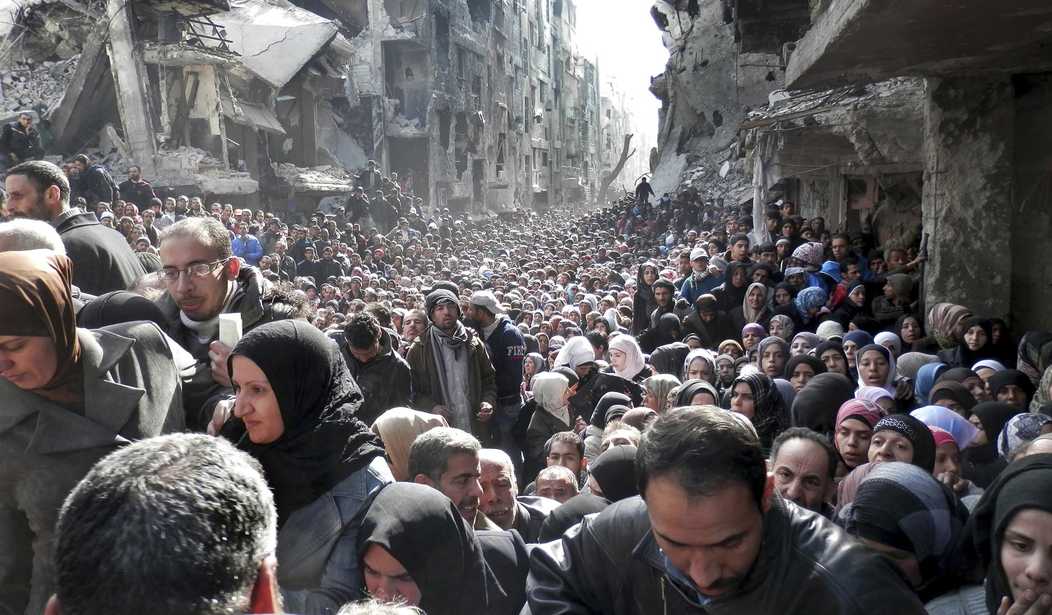The current war between Israel and Hamas has not only raised questions about the conflict itself but also about the history and politics behind it. One of the more pressing questions concerns the plight of the Palestinian refugees and their descendants, and it is a question that has been asked since the crisis began after Israel’s War of Independence in 1948.
The question is: Why haven’t Arab nations taken in Palestinian refugees and assimilated them into their own societies?
It would make sense, wouldn’t it? The easiest way for the entities claiming to care about Palestinians to ease their burdens would be to take them into their care. Yet, since 1948, the Arab nations, by and large, have refused to accept them.
Sir Alexander Galloway, who headed the United Nations Relief and Works Agency (UNRWA), gave us the answer to this question in 1952:
The Arab States do not want to solve the refugee problem. They want to keep it as an open sore, as an affront to the United Nations and as a weapon against Israel. Arab leaders don’t give a damn whether the refugees live or die.
In essence, the Arab nations and terrorist groups like Hamas and the Palestinian Authority (PA) view the Palestinian refugees as mere pawns in their overall fight against Israel, nothing more. It’s like having a scapegoat that conveniently doubles as a rallying cry for anti-Israel elements. What is even more galling about this reality is that the Arab nations are the ones who caused the Palestinian refugee crisis in the first place. You can read more about that here.
Lebanon has forced the refugees to endure appalling social and economic conditions, with many being confined to camps. The government enforces severe restrictions on Palestinians’ access to education, social services, and basic civil rights.
Egypt has also been reticent about allowing Palestinians into the country. After the 1948 war, the nation controlled the Gaza Strip but refused refugees entry into its borders, and it also prevented them from moving elsewhere. Now, the nation’s government still refuses to take in Palestinians, citing concerns about unrest.
“The political cost outweighs any of the benefits,” she [Nancy Okail, president and CEO of the Center for International Policy, a progressive nonprofit in Washington, D.C.] added, pointing to the potential for domestic unrest in Egypt if an influx of Palestinian refugees were to arrive.
But the prospect of a mass displacement from Gaza – a narrow, densely populated territory on Egypt’s northeast border – has heightened concerns in el-Sisi’s government.
Saudi Arabia has taken a similar stance to Lebanon, refusing to take in refugees. In the 1970s and 1980s, it chose not to employ Palestinians even when it faced labor shortages. Instead, the country recruited workers from Asia.
Ironically enough, shortly after the conclusion of the 1948 war, Arab nations systematically kicked most of its Jewish citizens out. In fact, the number of Jewish refugees fleeing Arab countries due to persecution was almost double the number of Arabs who left the region known as Palestine. Fortunately, these individuals took refuge in Israel, which gladly accepted them.
The exploitation of Palestinian civilians as a propaganda tool used by Arab nations and terrorist groups is a deeply entrenched aspect of the overall conflict. Despite professing solidarity with the Palestinian cause, they have refused to do much to help them. Indeed, the objective has always appeared to be the prolonged suffering of those living in Gaza and the West Bank. We can see this today in how Hamas routinely uses civilians living in Gaza as human shields and deliberately tries to maximize civilian casualties. In one instance, the terrorist group reportedly shot noncombatants trying to flee the area.
Israel’s enemies know it can continually use Palestinians as a public relations weapon because much of the international community will buy into the narrative they are selling. When Palestinians are killed, Israel automatically gets the blame while its enemies all but completely ignore the role Hamas has played.
Unfortunately, it does not appear that efforts to use Palestinians as pawns will end anytime soon. For Hamas, the Palestinian Authority, and other anti-Israel elements, they are far too valuable to give up. Helping them live in better conditions would be akin to sacrificing an important weapon. But, in the end, it is the civilians who are suffering the most.












Join the conversation as a VIP Member